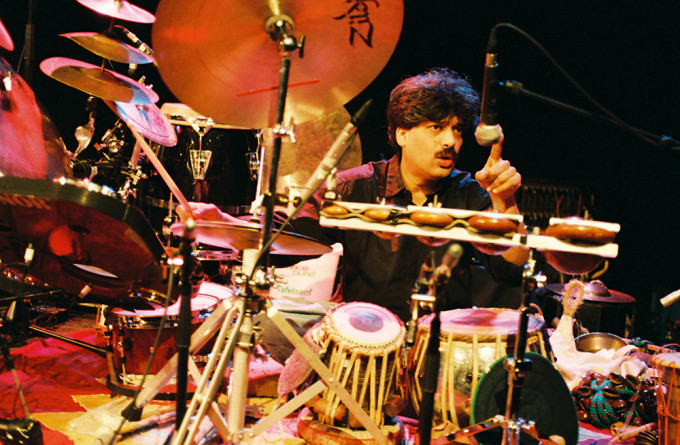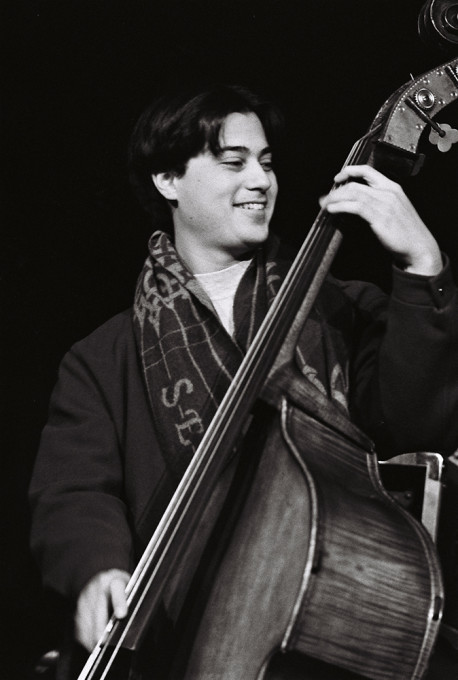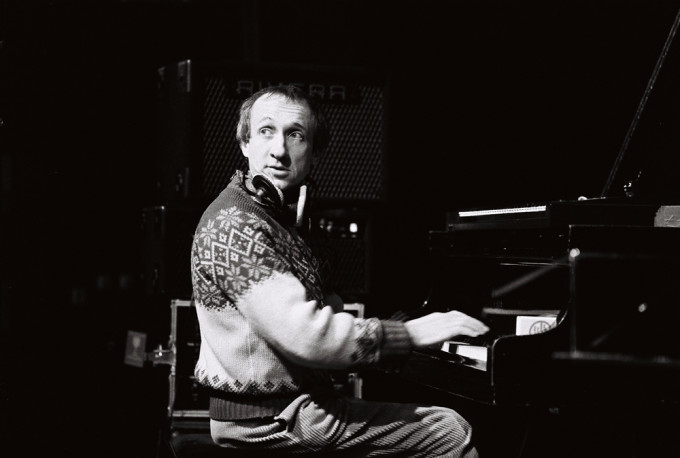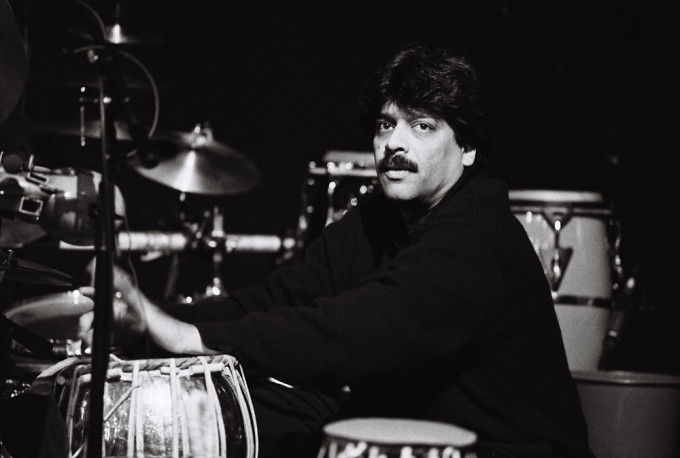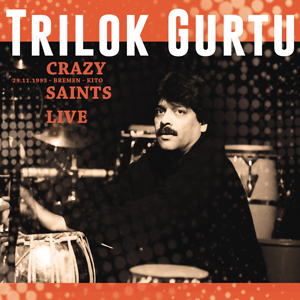Trilok Gurtu – Crazy Saints – Live
On the 1993 released studio-album „Crazy Saints“ first of all Pat Metheny and Joe Zawinul are dominating beside of Trilok Gurtu. Same yearTrilok Gurtu was on tour to support this album. On November 29th 1993 the “Trilok Gurtu’s Crazy Saints”-Trio with Daniel Goyone on keyboards and Chris Minh Doky on bass played a remarkable concert in Bremen.
Before Trilok’s music gradually changed to ‘Worldmusic’ ever since 1996, he was deep-rooted in Jazz in 1993. The conjunction of Indian Rythms with the elements of modern Jazz led to extraordinary aural experiences, impressingly documented on this concert recording. Trilok Gurtu’s matchless grooves, precise, virtuosic and punchy, are blending well with the widely textures, sound structures far from whiring Indian esoteric.
Bridges, no barriers, and the Bombay groove
An afroamerican jazz musician after Coltrane
„Making all kinds of music without categories, to reach people who love music in daily life, to get rid of names and drawers. Let music be as it is in its original form: it is a great medium to create and make the human race come closer to each other, making the world a better place to live in.” – Trilok Gurtu
His debut-album “Usfret” from 1987/88 documents a special lucky moment in the legislating of Trilok Gurtu. He dedicated his first work to “my mother Shobha Gurtu, my teacher Ahmed Jan Thirakwa, John Coltrane and Thelonious Monk”. The cornet of Don Cherry and the violin of L. Shankar are dancing around the touchy vocals of Shobha Gurtu, while her son Trilok and bassman Jonas Hellborg are forming the fantastic rhythm band. It is still fascinating to hear Trilok converting the pulsative finesse of Indian music to his self-designed drumset. The way he cheered for and fired his co-players’ imagination with his skills and precision, his spirited playing, tolerance and great latitude in expression always made him the key player, the motor of music, the torchbearer.
It must have been a special pleasure for him that his jazz guru Don Cherry joined his dream band; nearly no Afro-American jazz musician after Coltrane was as cosmopolitan as Cherry, dearly related to India and to non-European music cultures, at all. Don Cherry knew the writings of the Sufi-mystic and musician Hazrat Inayat Khan, who wrote, inspiring for many jazz musicians after Coltrane, about the rules (and secrets) of sound and rhythm: about breath and inner listening, about the psychological influence of music and the impact of sound to the human body. All knowledge and skills Trilok Gurtu absorbed in the years since he was “stranded” in Hamburg light up and throw out sparks in the title track of “Usfret”. Trilok Gurtu has a special relationship to Germany, but he always was a cosmopolitan, not only in the musical way, a cultural imprinted world citizen of jazz. Back then the French keyboarder Daniel Goyone collaborated as well, you can listen to him in this now released concert recording from 1993 in Bremen. It’s amazing that this music still sounds as fresh. It was also the year, when Trilok recorded the album “Ecotopia”, together with the American band Oregon, for ECM in Ludwigsburg. You can hear Oregon’s guitarist and co-founder Ralph Towner in some passages on “Usfret”, too. Two inspired sessions with the Indian percussionist took place some years ago: “Three Day Moon”, an atmospheric record of the bassist Barre Phillips (with guitarist Terje Rypdal, Oslo, 1978) and “Song For Everyone”, celebrated as a cult-album (1984, both on ECM) in the dream line-up of Shankar (violin), Jan Garbarek (sax), Trilok Gurtu and the virtuosic Tabla-player Zakir Hussain. Trilok needs less than a decade to add these highlights
to his vita.
It was time for Trilok Gurtu to realize his own albums then, and he found a lot of support and assistance in Walter Quintus and CMP-owner and producer Kurt Renker for his visionary contemporary Indo-jazz-fusion, based on very old knowledge of poly-rhythms. John Mc Laughlin’s groundbreaking group Shakti (with Shankar on violin and Zakir Hussain on Tabla) had shown stunning prospects in this direction since 1975. Trilok could build on a great basis of experience with what he and others developed over the years. That he was also a big fan of Weather Report and open-minded to electronic sounds, he already showed on the first CMP-record. In November 1989 Trilok Gurtu was part of a major musical event: the memorable concert of the John McLaughlin Trio at the Royal Festival Hall in London, released in the following year on JMT-Records. Trilok’s simply breathtaking interactions with McLaughlin and the marvelous interplay with Kai Eckhardt on bass made this record a must-have. Years later, in a long conversation with McLaughlin in Monaco he still remembered the magic skills of this percussion wizard.
The music on Trilok’s next album “Living Magic” (1990/91) was embossed by the sensitive saxophone of Jan Garbarek, with whom the meanwhile worldwide known percussionist played countless concerts to date; with no other great jazz musician Trilok’s work is as closely connected than with the Norwegian Garberek. But the main part of the music on “Living Magic” he created and formed with Daniel Goyone and the Brasilian percussionist Nana Vasconcelos, who also belonged to the close circle of Gabarek at that time. The fabulous “Once I Walked A Tree Upside Down…” aus “Living Magic” is one of his most marvelous studio field trips: the pure joy about Gabareks descant saxophone, wriggling through the fabulous wood land of Trilok’s and Nana’s Rhythms, says more than many words. It would be the perfect soundtrack for Mario de Andrades novel “Macunaima”. Later Trilok payed tribute to another Brasilian percussion virtuoso: Carlinhos Brown from Bahia. Both compositions “Baba” and “Tac Et Demi”, on this release in exciting Live-versions from the concert in Bremen, were originally on “Living Magic”. For the third CMP-production Trilok Gurtu played with Joe Zawinul and Pat Metheny’s guitar escorted the vocals of Shobha Gurtu in “Manini”. Little later Trilok had gathered the core of the “Crazy Saints”, Daniel Goyone (keyboards) and Chris Minh Doky (bass), sometimes increased by the American guitarist David Gilmore.
About that time I had the chance to experience the Trio, preliminary to the concert, when they unpacked their instruments and started to equipoise. I was impressed by the ‘high musicianship’ straightaway. Even the sound check was really thrilling and adumbrated the intention of Trilok’s band and what later happened in the concert in Bremen. It became clear that Trilok coaxed his mate Daniel Goyone more and more out of his shell – you can hear that on the following studio recording “Believe”(July 1994), too. “VAK”, a song by Daniel Goyone and the opener in Bremen, appeared half a year later in a shortened form on the studio album. Same year Trilok Gurtu was elected percussionist of the year by the critics of the American “Down Beat” magazine – that was the accolade. The most astonishing track on “Believe” comes at the end: in “Protector” it seems Trilok as a one-man-orchestra and pathfinder guides a group of pygmies through a scene from ‘Bladerunner’. Music for body and soul. In June 1995 Jan Garbarek’s impressive album “Visible World” appeared, with significant involvement of Trilok. With his CD “Bad Habits Die Hard” he was presenting a new lineup of his Crazy Saints (with Van Doky and Gilmore, without Goyone), extended with Bill Evans (saxophone), Andy Emler (keyboards) and Mark Feldman (violin).
The CMP-Records era ended with a production by eight musicians: the atmospheric record is his most gentle, maybe his most succeeded one after “Usfret”: “The Glimpse”. Meanwhile he had a British management and he was more focused upon Great Britain, where his music raised great interest, e.g. at the “Asian Dub Fraktion”. The sound was considerably ethnic from the first beats, partly even in the direction of chamber music. The bandleader moved away from the “Weather Report”-influenced jazz-rock. Like often before he newly pulled the strings he span years before without putting his past experiences aside. After ten years everything came full circle and the percussion-magician remembered sounds, colors, faces and voices to restage a new ritual.
Suddenly everything was back again, the trumpet of “Usfret” (this time played by Paolo Fresu from Sardinia) and the Indian vocals (by Geetha Bennett). “The Glimpse” is a ritual and a requiem at the same time: from the opener “Cherry Town” till the finale “Don”. Hints for a return to the beginnings, partly hidden in the small sentence to his big friend and guru, who died one year before in Malaga: “Don, this record is for you.” Like through a dark tunnel of memories the music again starts to dance and to fly. The master of persuasiveness Trilok Gurtu whirls it high, rubbing matter like a nomad, who sparks a fire in the desert. Swirling around the lambent flames at dusk like a dancing dervish.
New adventures were in front of him. When he recorded the astonishing album “Farakala” with the Frikyiwa Family 2005 in Mali, dedicated to his spiritual teacher Ranjit Maharaj, he harmonically integrated himself into the West-African ensemble, as if he was grown up in Mali. Somebody once described life as a serious of missed rendezvous. What would have happened e.g. if Trilok played with Miles Davis around “On The Corner”? On his fulminant album “Spellbound” he fulfilled this desire and played a far-out medley from “Jack Johnson/Black Satin” with Nils Petter Molvaer – picking up the message of Miles. On another track you can hear him with more trumpeters: Matthias Schiefl, Ibrahim Maalouf and Paolo Fresu. There is something in jazz that crows over death and fugaciousness, it shines on, like the Olympic fire. Trilok Gurtu is one of the great torchbearers
of this music.
2015, Karl Lippegaus
(author of “Coltrane”, Edel Books, 2011)
Tracklisting
CD 1 :
1. Chant D’Oiseau/VAK 13:36
2. Baba 10:48
3. Tillana 08:48
4. Blessings In Disguise 14:25
5. The Sequel/Living Magic 13:42
CD 1 complete: 61:19
CD 2 :
1. No Discrimination 04:41
2. Goose Bump/Bouches D’Or 14:10
3. Barcarolles No.8 & No.5 03:10
4. Danse Des Lamantins 07:02
5. Pascha’s Love 19:02
6. Tac Et Demi/Maracatu 09:41
CD 2 complete: 57:46
Fotos
